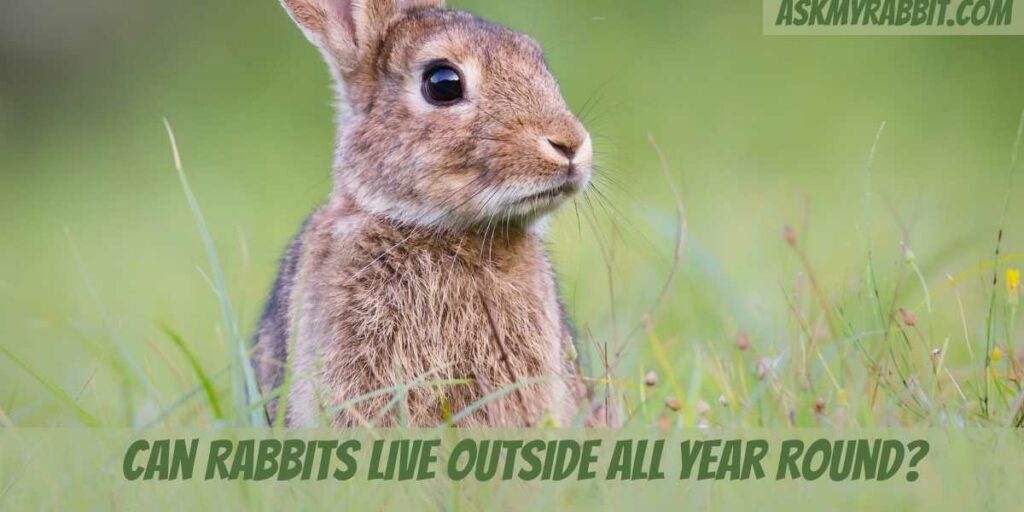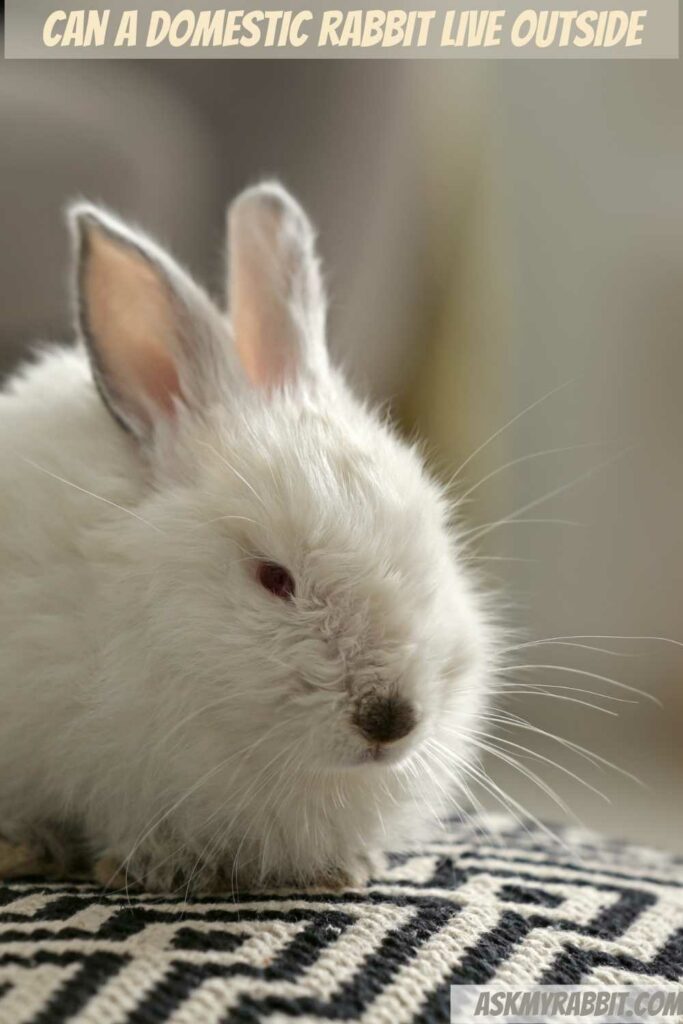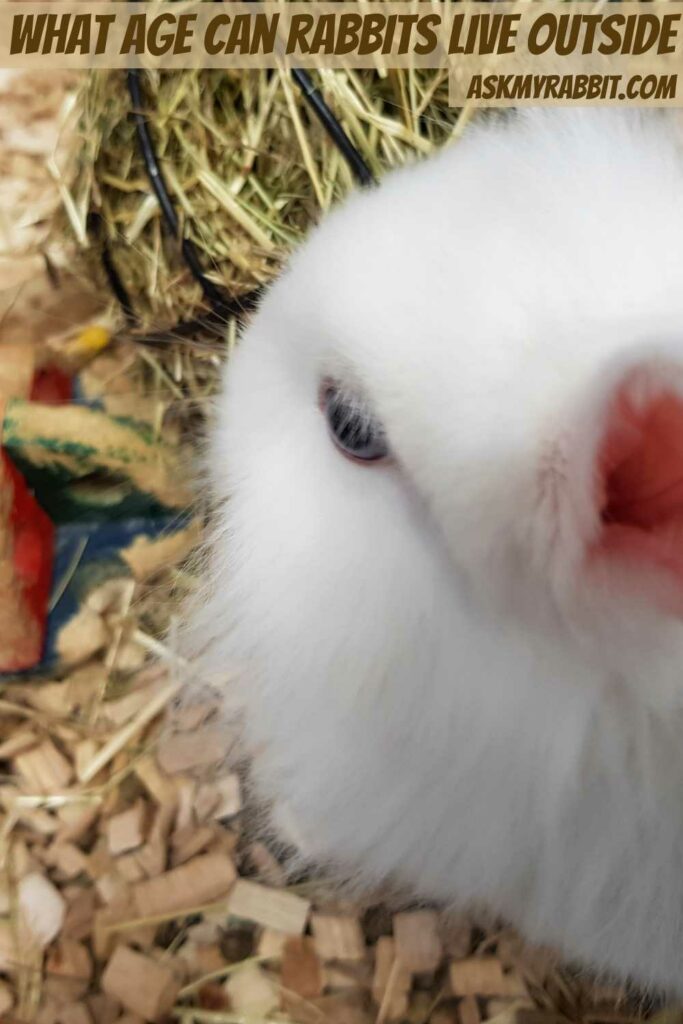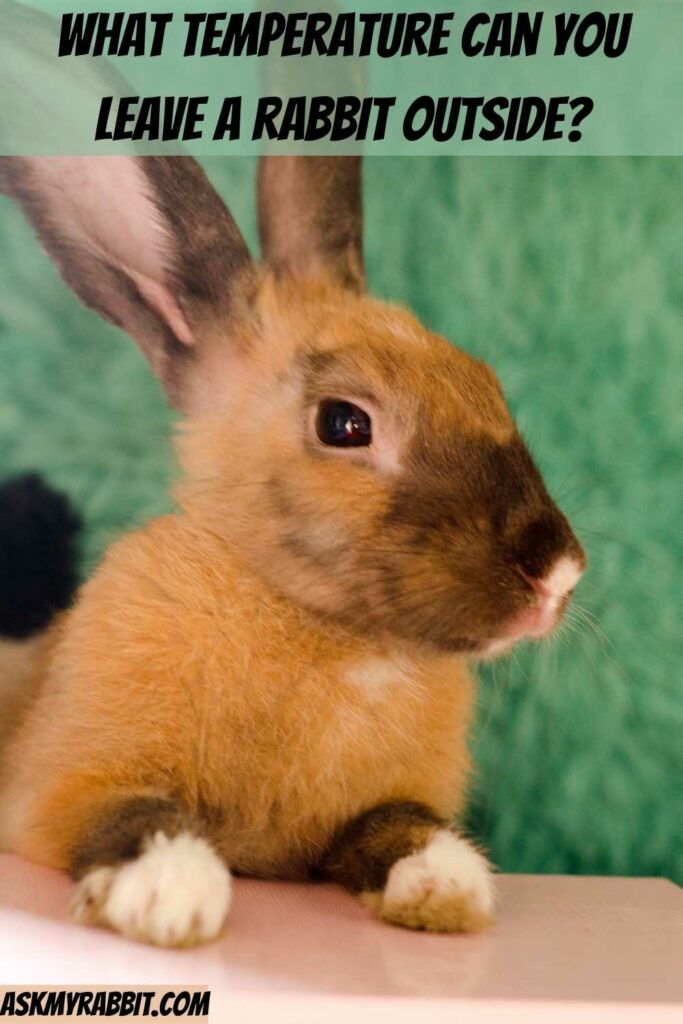For a rabbit, the environment is where it lives, not where it sleeps, eats, exercises, and plays.
Rabbits should be provided adequate space with sufficient air or ventilation and also protection from predators and a nice shelter during extreme weather.
So, rabbits are able to live outdoors all year round but with the condition that a proper shed is provided to them as their resting area so that they can save themselves from predators and adverse weather conditions.
Rabbits usually need free open spaces as their nature demands that; but also a safe shelter to survive from obstacles.
Now you might be asking, if rabbits need a proper shelter to live outside, what other limitations and conditions do they have to live in the outdoors? Can they live outside in the summer heat or the winter chill?
Let’s find out!

Can A Domestic Rabbit Live Outside?

One must be very careful, alert, and meticulous in doing so. You should make sure that your rabbit is living in a safe place, has a shelter, has the right conditions to live, and has plenty of ways to regulate its body temperature if it’s too cold or too hot.
Rabbits are animals that need definite living conditions to stay healthy and happy. And domestic rabbits, become habitual of being pampered and a safe environment, which indicates that keeping them outside is a little tricky.
Although, in practice, they can live outside because these bunnies are meant to have open surroundings in which they can play.
Some points which you must be mindful of when your pet bunny is living outside are:
- Danger from predators
- The possibility of them escaping
- they may consume food that is poisonous to them
- extreme weather conditions
- them developing a feeling of loneliness after some time.
What Age Can Rabbits Live Outside?

As they are by nature outdoor creatures, it is safe for rabbits to be taken outside. Despite being domesticated, pet rabbits can certainly benefit from the fresh air, grass to munch on, and space to play in.
However, it is important to time your baby rabbit’s introduction to the great outdoors.
Although baby bunnies can be allowed and are capable of exploring the outside world when they are four weeks old, they should always be kept under control or under watch, for their own safety.
In the outside world, especially for these small creatures, there are many dangers for them.
And these dangers can fall on your rabbit if it is left alone outside. These include poisonous plants, extreme temperatures, and predators such as cats, hawks, and snakes.
What Do Rabbits Need To Live Outside?
Rabbits should be protected from bad weather, and from strong sunlight as they can get heatstroke and changes in the temperature. There should be proper food for them as sometimes they might eat poisonous food, so to avoid this, proper food should be available to them.
There should be a proper shelter for them. There are some important reasons for having a proper shelter for them to survive in the great outdoors. During weather changes, they can protect themselves by being in shelters.
For example, in winters, they can hide in these shelters so that their body temperature will be balanced according to the outside weather.
Then to keep themselves safe from predators, they can hide in their shelters whenever they sense any dangers around them.
In the outdoors, a cover, blanket, or a piece of cold carpet or other insulation material could offer added protection on cold nights, provided there is enough ventilation.
What Temperature Can You Leave A Rabbit Outside?

Rabbits prefer temperatures of about 60-65 degrees Fahrenheit. Rabbits are comfortable in lower temperatures as long as they have proper shelter or are properly housed.
When your rabbit’s hutch is outside, it must be waterproof and should have a solid roof. This is because of challenging weather conditions and predators. So for their safety, it is important to have a proper shelter made for them.
Avoid sealing up the hutch entirely as they need proper ventilation too. So to prevent excess moisture build-up, sealing it up should be avoided as too much moisture can lead to illness.
Wet conditions can lower a rabbit’s body temperature very quickly. So frequently checking the hutch of your rabbit will be a good idea to make sure it is clean and dry.
Very young or old rabbits, or those with medical conditions, should be kept indoors because they may not be able to tolerate cold temperatures even with modifications to their hutches and diets.
Temperatures below 20 degrees Fahrenheit may be too cold even for those rabbits that are healthy enough.
If the temperature inside the hutch seems too cold, adding extra insulation will be a good option but not too much so that the hutch still has proper ventilation.
Providing extra food will ensure that your rabbit can consume enough calories to endure the winter cold. The main concern in the cold weather is access to freshwater for rabbits.
Use heated water bowls or bottles and keep checking them frequently to make sure the water remains unfrozen.
Frequently Asked Questions
What temperature is too cold for rabbits?
It has been observed that a temperature below 20 degrees Fahrenheit is too cold. It is extreme for healthy adult rabbits too. That’s why it is preferred and said that the shelter where rabbits are staying or their safe place should be warmer. Due to a rabbit’s body heat, you should try to make a balance between both the environmental temperature and the ambient temperature inside the hutch.
Is it cruel to keep bunnies outside?
It is not at all cruel to do anything like this. As these social creatures need space to play and explore. No matter where they are, rabbits are never seen to sit in one place and just chill out there. So it is more than okay to keep your bunny outside. But they must have the right setup for shelter and for surviving in many adverse environmental conditions. It is important to make sure your bunny has everything they need.
Do rabbits get cold at night?
Rabbits are known as cold-weather animals. It has been observed in research that they are highly temperature resistant, which indicates that they can handle temperatures down to 30 degrees Fahrenheit.
But they should have a shelter where the temperature is warm, which will help them to cope with the body temperature and will create the perfect balance and convenience for these bunnies.
Do rabbits get hot?
Rabbits regulate body heat through their ears. They can tolerate cold weather but cannot tolerate too much heat, and in some cases, they can die from becoming overheated.
A temperature above 77 degrees Fahrenheit is very dangerous for rabbits. In summers, heat exhaustion can be an issue for all rabbits but the fuzzy, overweight, old and young are especially at risk.
Heatstroke in rabbits?
Heatstroke occurs when a rabbit gets too hot and is unable to regulate its body temperature.
And this is a serious illness seen in rabbits and can also prove to be fatal. That’s why it is important to give them proper shelter because hot temperatures are not bearable for bunnies. So to keep them safe, the temperature of their surrounding should be according to their comfort.
Conclusions
These little creatures are those who need care and ask for responsibility either when they are indoors or outdoors because in the outside world or the outdoors, which they sometimes need to explore, contains many obstacles for them.
Many rabbits prefer to stay in a familiar environment, but you should make suitable arrangements with a neighbor or pet sitter. You should make sure that they can meet all your rabbit’s needs, like proper food, shelter, and safety from predators.






